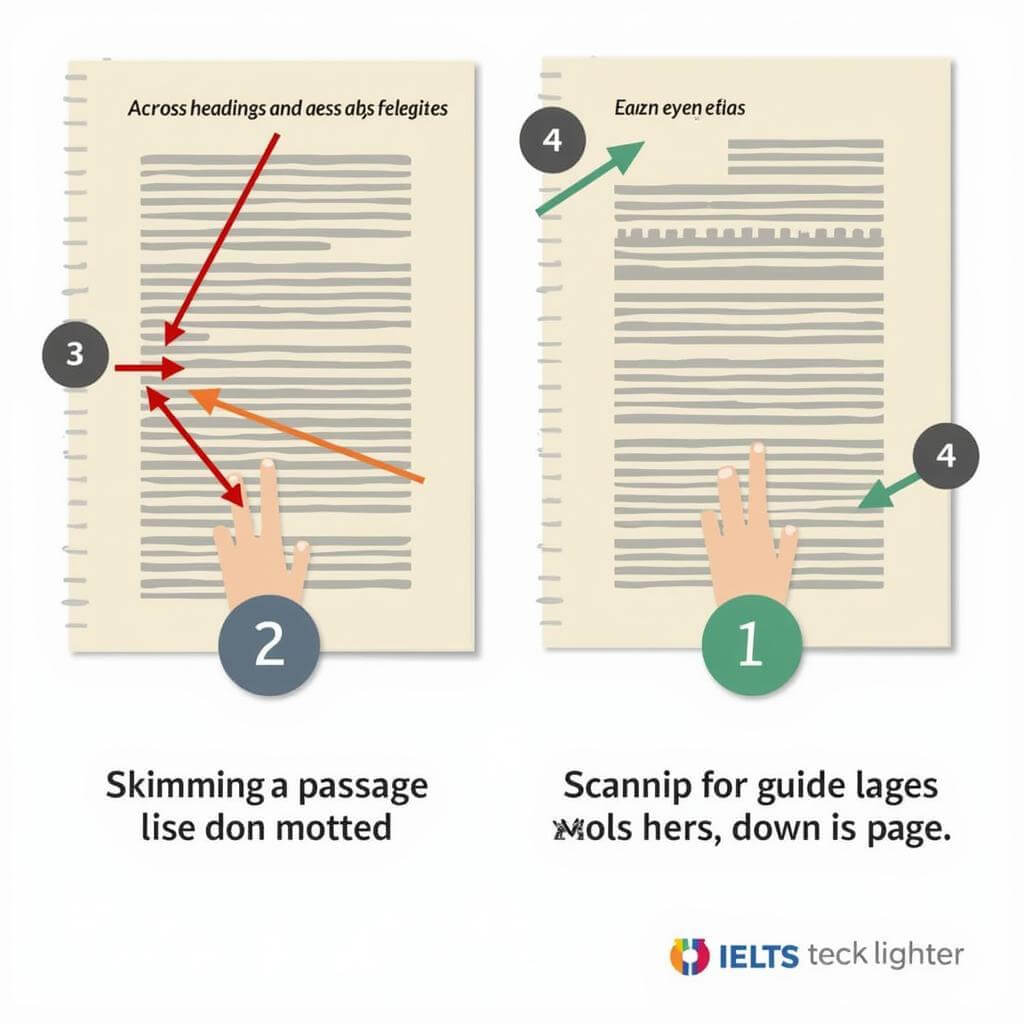Are you struggling to finish the IELTS Reading section on time? You’re not alone. Many test-takers find themselves racing against the clock, compromising accuracy for speed. But fear not! This guide will equip you with ten effective strategies to improve your IELTS reading speed without sacrificing comprehension.
1. Master the Art of Skimming and Scanning
Skimming and scanning are essential techniques for quickly navigating IELTS reading passages.
Skimming for the Big Picture
- Read the title, headings, and first/last sentences of each paragraph
- Focus on getting a general idea rather than understanding every detail
- Practice skimming newspaper articles or online blog posts daily
Scanning for Specific Information
- Use your finger or a pen to guide your eyes down the page
- Look for keywords related to the question you’re answering
- Don’t read every word; let your eyes jump from one keyword to another
Dr. Emma Thompson, an IELTS expert with over 15 years of experience, states: “Mastering skimming and scanning can save you precious minutes in the IELTS Reading test, allowing more time for challenging questions.”

2. Expand Your Vocabulary
A robust vocabulary is crucial for improving reading speed for IELTS exam. The more words you know, the faster you’ll process text.
- Learn 10-15 new words daily, focusing on academic and topic-specific vocabulary
- Use flashcards or vocabulary apps for regular review
- Read widely across various subjects to encounter words in context
3. Practice Active Reading
Engage with the text to boost comprehension and speed:
- Preview the questions before reading the passage
- Highlight or underline key information as you read
- Make mental connections between the text and questions
- Jot down brief notes or symbols in the margins
This approach helps you focus on relevant information and quickly locate answers when needed.
4. Time Your Practice Sessions
Simulate test conditions to improve your pacing:
- Use a timer for each practice passage
- Gradually reduce your time limit as you improve
- Aim to complete each passage in 20 minutes or less
Regular timed practice will help you develop a sense of urgency and improve your time management skills.
5. Improve Your Focus and Concentration
Maintaining focus is crucial for improving focus on specific paragraphs and overall reading speed. Try these techniques:
- Practice mindfulness or meditation to enhance concentration
- Eliminate distractions during study sessions
- Take short breaks between passages to refresh your mind
- Use the Pomodoro Technique: 25 minutes of focused reading followed by a 5-minute break
6. Develop a Strategic Approach to Different Question Types
Each IELTS Reading question type requires a specific strategy. For example:
- For matching headings, focus on the main idea of each paragraph
- How to answer true/false questions quickly: Look for specific details that confirm or contradict the statement
IELTS trainer Sarah Lee advises: “Familiarize yourself with all question types and develop a targeted approach for each. This will significantly boost your speed and accuracy.”
7. Improve Your Reading Fluency
Enhance your ability to read smoothly and quickly:
- Practice reading aloud to improve flow and reduce subvocalization
- Use a pacer (finger or pen) to maintain a steady reading pace
- Challenge yourself to read slightly faster than your comfortable speed
8. Utilize Context Clues
Don’t get stuck on unfamiliar words. Use context to infer meaning:
- Look at surrounding words and sentences for clues
- Consider the overall topic and tone of the passage
- Move on if the word isn’t crucial for understanding the main idea
This skill is particularly useful when strategies for handling tricky passages come into play.
9. Build Your Background Knowledge
Familiarity with various topics can significantly increase your reading speed:
- Read widely across subjects like science, technology, history, and current affairs
- Watch documentaries or educational videos on diverse topics
- Discuss complex ideas with peers or in study groups
The more you know, the faster you’ll grasp new information in IELTS passages.
10. Analyze Your Mistakes
Regular self-assessment is key to improvement:
- Review incorrect answers after each practice test
- Identify patterns in your mistakes
- Develop targeted strategies to address weak areas
- Track your progress over time
Dr. Thompson emphasizes: “Learning from your mistakes is crucial. Each error is an opportunity to refine your approach and boost your performance.”
Conclusion
Improving your IELTS reading speed is a gradual process that requires consistent practice and a strategic approach. By implementing these ten tips and regularly strategies for improving comprehension with practice tests, you’ll see significant improvements in both your speed and accuracy. Remember, the key is to practice regularly and stay motivated. With dedication and the right techniques, you’ll be well on your way to achieving your target IELTS Reading score.
FAQs
-
How long does it take to improve IELTS reading speed?
Improvement varies by individual, but most see noticeable progress within 4-6 weeks of consistent practice. -
Can reading speed negatively affect comprehension?
If rushed, comprehension can suffer. The goal is to balance speed with understanding through practice. -
Are there specific reading materials best for IELTS practice?
Use a mix of IELTS practice tests and academic articles from reputable sources like scientific journals and quality newspapers. -
How many practice tests should I complete before the actual IELTS exam?
Aim for at least 10-15 full-length practice tests to build confidence and familiarity with the format. -
Is it better to read the questions or the passage first in the IELTS Reading test?
Most experts recommend quickly previewing the questions before tackling the passage to guide your reading focus. -
How can I stay motivated while practicing IELTS reading?
Set realistic goals, track your progress, and reward yourself for improvements to maintain motivation.